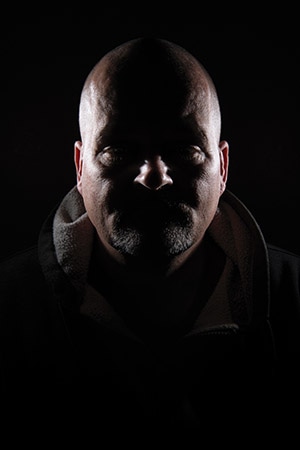Early this year, a Klan group known as the Knight Riders closed up shop after one of its members who was allegedly planning racist violence pleaded guilty to weapons charges. The former Klan member and FBI informant who made the case discusses his own background, details of the investigation, and how he “grew a conscience.”
As a kid growing up in a white, working-class family in southern Ohio, Bob’s best friend was African-American. He admits it might be hard for most folks to accept this, seeing how his life has turned into a bad country song — addiction, prison and, if he’s lucky, redemption. Still, he swears it’s true. The two boys were tight. They spent the night at each other’s homes. They went to Catholic school together.
The black kid’s name was Gene. Bob was on the hefty side. He got picked on a lot. But Gene never teased him. Not in a million years would Gene believe that his bosom buddy grew up to be a hooded, card-carrying member of the Knight Riders, Knights of the Ku Klux Klan. At least Bob hopes he wouldn’t. “I was never comfortable with being in the Klan,” he says. “Even when I was in the thick of it, I did not sling around the N-word like most of the guys.”

Bob, who asked that his last name not be used, is not proud of his time in the Knight Riders. But he is proud that he helped bring them down.
On Jan. 4, 2014, the Knights, with 13 chapters spanning seven states from Florida to Illinois, officially disbanded. The usual suspects were to blame — stupidity, paranoia and a federal informant, in this case a 45-year-old ex-con Klansman named Bob. “They know I was the one who brought them down,” he says. “I got a lot of people pissed at me.”
The Knights’ imperial wizard, a 53-year-old truck driver called “Brother Red” based in Live Oak, Fla., shut down the group three weeks after one of his followers, Michael Lee Fullmore, pleaded guilty in Virginia federal court to illegally selling guns to a convicted felon. The weapons sales were part of a scheme, prosecutors alleged, to bankroll the startup of a violent splinter faction, a racist strike force targeting African Americans and Latinos. Brother Red, whose real name is Jeff Jones, was anxious that he might be held accountable for actions of what he called a “rogue Klansman,” acting alone. He said for a while he expected to be dragged from his Florida home in handcuffs in the middle of the night by an FBI anti-terrorism team.
“I don’t want to go to jail and be surrounded by people I don’t want to be around in the first place,” Jones told the Intelligence Report, adding that he had nothing to do with Fullmore’s plans. “The jails are full of blacks and Mexicans.” The FBI, Jones continued, infiltrated the group “and tore it to pieces and idiots on the inside finished it off. It was destroyed from within.”
The authorities won’t confirm the identity of the informant. But Bob says he’s the guy. And what he says happened during his many stressful months wearing a wire and what the Feds say they learned from the work of the informant, or confidential human source, as they prefer to say, match up nearly deed for deed. “Mike,” Bob says, “pretty much thought the rest of the Knight Riders were pantywaists and didn’t want to do anything. He wanted to go back to the old terror tactics of the Klan. He wanted to do snatch-and-grabs of minorities. He wanted to firebomb the church. He wanted to put the Klan back on the map.”
It wasn’t long after FBI agents slapped the cuffs on Fullmore in the spring of 2013 that he admitted to making the statements about murder and mayhem, according to the federal prosecutor in Virginia in charge of the case, Zachary Lee. “He said he didn’t mean it,” Lee says. “He said he was just talking.”
Fullmore, 30, was the only person arrested and charged. After pleading guilty just before Christmas to gun and drug offenses, he was sentenced to 52 months in federal prison. Fullmore’s court-appointed defense attorney did not respond to an interview request from the Report.
Shortly after the Knights announced they were going out of business, Bob contacted the Report over the objections, he says, of his FBI handler, who was worried about his safety. Bob worries about that, too. “These are some scary people,” he says. But he thought it was important to tell his story, he says, so someone else in his shoes could learn from his mistakes and perhaps copy his recent example. “I guess you could say I grew a conscience,” he says. “I guess you could say I was trying to make amends.”
A Church in the Crosshairs
By the time he was arrested, the FBI had been investigating Fullmore for more than a year, watching and listening as he illegally sold guns, first to a wire-wearing informant, and later to an undercover agent introduced to him by the informant. Fullmore, who lived near Claxton, Ga., even shipped a disassembled semi-automatic AK-47 rifle, its serial number filed off, by UPS to the informant in Virginia.
The investigation was scheduled to continue for weeks or months, long enough, authorities hoped, to determine whether Fullmore’s vow that he could supply military-grade explosives to antigovernment militia groups or to anyone else willing to pay was fact or fiction. He said he had a source at Fort Stewart, the sprawling Army base that was a short distance from the trailer home where he lived with his wife and young son.
Investigators never learned the truth about the explosives. When Fullmore started talking to the informant about firebombing a specific Catholic church filled with Latino worshipers in Claxton, the FBI swept in and arrested him in June of 2013, abruptly ending the investigation. “The escalation of his activity for us was getting to a point where we didn’t believe we could ignore it or allow him to remain out there on the streets,” Lee, the prosecutor, says. “When he took it a step further to say, ‘Now I’ve got this church that I want to firebomb,’ it had gone from a concept to the first steps of implementing a plan to the next step in the plan which we believe he was going to do, which is identify a specific target for that organization to attack.”
A former high-ranking member of the Knight Riders, who was banished from the group before Fullmore’s arrest, told the Report that Fullmore came to his Georgia home one day, wearing a big grin and carrying a large box. Fullmore said it was a “present” for the older Klansmen. The man told Fullmore to put the box down in a corner “but I didn’t look inside for a few days.”
When he did, the middle-aged Klansmen discovered the box was filled with explosives and blasting caps. “I couldn’t get that shit out of my house fast enough,” the man says.
Still, Fullmore “seemed like a pretty decent guy,” the former Klan official says. He was one intense dude, though. He had a teardrop tattoo, which usually means the wearer has spilled blood — or is pretending to have. Fullmore also had a way of staring at a person that made even tough guys uneasy. “A lot of people didn’t know how to take him,” the former Klansman says. “He didn’t look like somebody that would play around.”
Fear and Loathing
Fullmore and Bob were buddies. Yet, to this day, Bob says he’s not sure if Fullmore was serious about stringing up black people and bombing brown ones. “It was hard to differentiate what was serious and what was just air,” Bob says. “But do I think he had it in his character to do it? Yes, I do.”
That belief kept Bob awake at night — literally. Bob made at least a dozen bus trips for the FBI to Georgia to stay with and spy on Fullmore. Once he got there 13 hours later, Bob would stay awake for the entire visit, which typically lasted three to four days. He didn’t need coffee to do it. He had adrenaline and fear. “You’re doing something that you don’t really want to relax too much and let go and go to sleep,” he says. “You don’t know if you close your eyes if it’s going to be the last time you close them.”
“It was a very stressful thing,” he continues. “You’re equipped with a recording device and you’re going into the lion’s den, so to speak, knowing discovery could mean death.”
He’d catch an occasional catnap when no one was looking. Otherwise he’d stay up all night on the couch, watching television. “The threat of death hanging over your head for several days at a time, combined with physical exhaustion, it’s not an easy thing,” he says. Back home, Bob’s wife was almost as sleepless, fearing for her husband’s safety and caring for their newborn and three other children under age 10. “It was constant worry the whole time he was gone,” she says. “But it wasn’t like I could go to my friend and say, ‘Hey, I really need to talk to you about this.’ It was just between Bob and me. There was nobody I could go tell what was going on.”
One night in Georgia, Bob thought he was a goner. He was standing outside the Fullmore’s home smoking a cigarette. Fullmore came out and said they had to go see the grand dragon right away. “Mike was in a foul, hateful mood,” Bob says. Bob told Fullmore he had to go inside to get his phone. “We ain’t got time for that,” Fullmore snapped. “Just get in the f—— car.”
“I’m kind of thinking to myself,” Bob says, “they’ve found out somehow, this is getting ready to be really bad.”
Bob wanted to take off running into the Georgia night. He wanted to run all the way back to his wife and kids. It took everything he had to get into that car.
“I could have blown the whole operation by running,” he says. “I remained calm as best I could. As it turned out, Mike was just in a bad mood. He had just got his butt ripped by his wife.”
Prison as Incubator
The bureau has long relied on insiders like Bob against the Klan. “It’s been said there have been several thousand people who have been Klan informants over the years,” says Gary May, a history professor at the University of Delaware and the author of The Informant: The FBI, the Ku Klux Klan and the Murder of Viola Liuzzo. “Sometimes they provide information that proves to be effective in putting some guys away. But it’s a real deal with the devil.”
Bob was no angel. He started getting in trouble with the law when he was 13. He took his parent’s car for a joyride. His father, a welder, called the cops to teach the boy a lesson. “Of course, I didn’t learn nothing,” he says. After that he was in and out of the juvenile legal system, mostly, he says, for minor stuff. “I had sticky fingers back then.”
As an adult, living in Cleveland, he caught a burglary charge. All told, he spent seven years in prison, where he met a KKK grand dragon, serving time for badly beating up his girlfriend. Bob was a petty criminal. He wasn’t a Klansman. Not yet.
His folks didn’t raise him to be a knucklehead or a racist. The dragon, a smooth-talker, tried to change that. “He could make stepping in crap sound good,” Bob recalls.
They talked Scripture and the plight of the white man. But Bob says he didn’t join, although he was tempted. “I wanted to belong to something,” he says. “I really didn’t have no family. I didn’t have anybody. It sounds like a country song, don’t it?”
He was released from prison in 2001. “Once I left, I really didn’t have any contact with Klan-type people,” he says. Two years later he moved to Virginia, where he met his wife. They were married in 2006. The couple lived in Northern California for a short time — long enough for Bob to pick up a serious pain pill addiction.
Bob finally joined the Klan in 2010 after meeting another grand dragon who worked at the corner gas station in Bob’s Virginia neighborhood. Bob filled out an application and became a hooded American on Nov. 21, 2010, at a ceremony in Ellijay, Ga.
Bob says he still can’t explain exactly why he gave in and became a Klansman. Maybe a shrink can, but he can’t. His wife says racism still hangs thick in the Southern air. Everywhere you go, she says, you hear about the bad Mexicans and the lazy blacks. “There are churches that preach they don’t think there should be race mixing,” she says. “We’ve heard it all our lives.”
Bob seems to have been a more-than-willing recruit. In an Internet forum discussing the merits of a black kid working as a grocery store bagger, Bob proclaimed, “I’m a racist through and through and could give two shits if anyone likes it or not.”
Making the Case
Bob first met Mike Fullmore at a Klan rally in Corinth, Miss., in 2011. Fullmore came from a Georgia klavern, Bob from Virginia. They hit it off at the post-rally cookout on a nearby farm. Then they joined a circle of their fellow Klansmen in their robes and hoods for the cross burning. It was Bob’s first. It wasn’t full dark when they started, trying to get it done before a drizzle turned to rain. “I wasn’t impressed,” Bob says.
After the rally, the men stayed in touch. Bob rode a bus for nearly 13 hours one-way to visit Fullmore and his family in Claxton. Soon, he says, Fullmore started repeatedly complaining about the “pantywaists” running the Klan. Nobody feared or respected the KKK anymore. Fullmore, he says, was determined to change that — with violence. The idea made Bob nervous. “I will honestly say,” he says, “the first thing when you go in [the Knight Riders], they make you sign a nonviolent thing, saying if you’re caught being violent they will expel you. Jeff Jones was real strict about that. But honestly, I felt that was just covering butts so they wouldn’t get sued.”
Bob says he soon reached out to the FBI and talked about working as an informant because he was worried that Fullmore’s talk would turn to action. His work with the FBI, however, did not begin in earnest until after he was busted for selling some of his prescription pills to a police informant in 2012. He was convicted but received probation. Bob denies that getting out of legal hot water was his motivation. “I have four kids,” he says. “I didn’t want them to grow up in a world where they think it’s okay to hurt people or discriminate against them.” But Jones, the imperial wizard, isn’t buying that. “I think personally he’s the one who lured Mike into selling the guns to save his own bacon,” Jones says. “I don’t think Bob really wanted to do it. But it was that or probably going to jail.”
Fullmore legally purchased several weapons at a Georgia pawnshop, including four handguns and the AK-47. Then he sold them to Bob, who was supposed to turn around and sell the guns to militia groups or felons to fund what prosecutors called Fullmore’s plans to start a “vigilante splinter group.” Fullmore also sold a weapon and a small amount of marijuana to an undercover agent in Virginia.
Lee, the federal prosecutor, says that his office and the FBI “took some pains” not to investigate the Knight Riders as a whole and were careful not to infringe upon the Klan’s First Amendment rights. “We were focused on the Knight Riders,” he says, “solely to determine if they as a group were sponsoring this violent organization that Mr. Fullmore was trying to get started, or if it was just him.”
Since no one else was arrested or charged in the case, the prosecutor says he was surprised that the Knight Riders decided to disband. “But then again, I guess I can understand it,” he says. “If they believed that their ranks had been infiltrated, they may have some concern about other activities they’re involved in that they don’t want law enforcement to know about.”
Bob, however, doesn’t believe the Knight Riders have truly disbanded. He says the group, which had up to 70 members, has gone underground. “They haven’t closed up shop,” he says. “They were actually talking about going so-called underground before all this got started. You can rename the Klan daisy flowers if you want to, but it’s still the Klan” — above ground or under it.




